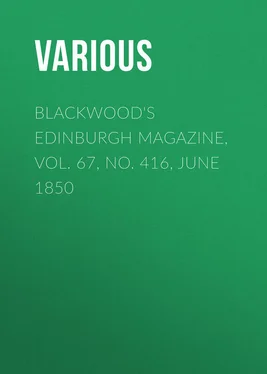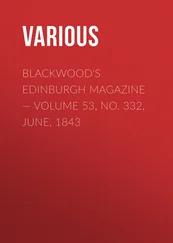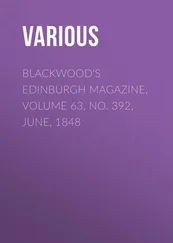Various - Blackwood's Edinburgh Magazine, Vol. 67, No. 416, June 1850
Здесь есть возможность читать онлайн «Various - Blackwood's Edinburgh Magazine, Vol. 67, No. 416, June 1850» — ознакомительный отрывок электронной книги совершенно бесплатно, а после прочтения отрывка купить полную версию. В некоторых случаях можно слушать аудио, скачать через торрент в формате fb2 и присутствует краткое содержание. Издательство: Иностранный паблик, Жанр: periodic, foreign_edu, Путешествия и география, на английском языке. Описание произведения, (предисловие) а так же отзывы посетителей доступны на портале библиотеки ЛибКат.
- Название:Blackwood's Edinburgh Magazine, Vol. 67, No. 416, June 1850
- Автор:
- Издательство:Иностранный паблик
- Жанр:
- Год:неизвестен
- ISBN:нет данных
- Рейтинг книги:5 / 5. Голосов: 1
-
Избранное:Добавить в избранное
- Отзывы:
-
Ваша оценка:
- 100
- 1
- 2
- 3
- 4
- 5
Blackwood's Edinburgh Magazine, Vol. 67, No. 416, June 1850: краткое содержание, описание и аннотация
Предлагаем к чтению аннотацию, описание, краткое содержание или предисловие (зависит от того, что написал сам автор книги «Blackwood's Edinburgh Magazine, Vol. 67, No. 416, June 1850»). Если вы не нашли необходимую информацию о книге — напишите в комментариях, мы постараемся отыскать её.
Blackwood's Edinburgh Magazine, Vol. 67, No. 416, June 1850 — читать онлайн ознакомительный отрывок
Ниже представлен текст книги, разбитый по страницам. Система сохранения места последней прочитанной страницы, позволяет с удобством читать онлайн бесплатно книгу «Blackwood's Edinburgh Magazine, Vol. 67, No. 416, June 1850», без необходимости каждый раз заново искать на чём Вы остановились. Поставьте закладку, и сможете в любой момент перейти на страницу, на которой закончили чтение.
Интервал:
Закладка:
As to the Nobler gentry, who are to surround the Noblest, whenever that Cromwell Redivivus shall appear, there is, in Mr Carlyle's opinion, no such pitiable uncertainty. They may not, perhaps, be altogether as plentiful as blackberries on an autumnal hedge, yet nevertheless they are to be found. "Who are available to your offices in Downing Street?" quoth he. "All the gifted souls, of every rank, who are born to you in this generation. These are appointed, by the true eternal 'divine right' which will never become obsolete, to be your governors and administrators; and precisely as you employ them, or neglect to employ them, will your State be favoured of Heaven or disfavoured. This noble young soul, you can have him on either of two conditions; and on one of them, since he is here in the world, you must have him. As your ally and coadjutor; or failing that, as your natural enemy: which shall it be?" Now, this we call speaking to the point. We are acquainted, more or less intimately, with some couple of dozen "noble young souls," all very clever fellows in their way, who have not the slightest objections to take permanent quarters in Downing Street, if anybody will make it worth their while; and we undertake to show that the dullest of them is infinitely superior, in point of intellect and education, to the present Secretary of the Board of Control. But are all the noble young souls, without exception, to be provided for at the public expense? Really, in these economical times, such a proposal sounds rather preposterous; yet even Mr Carlyle does not insinuate that the noble young souls will do any work without a respectable modicum of pay. On the contrary, he seems to admit that, without pay, they are likely to be found in the opposition. Various considerations crowd upon us. Would it have been a correct or a creditable thing for M. Guizot to have placed in office all the noble young souls of the National , simply by way of keeping them out of mischief? The young nobility connected with that creditable print certainly did contrive to scramble into office along the ridges of the barricades, and a very nice business they made of it when they came to try their hands at legislation. But perhaps Mr Carlyle would only secure talent of the very highest description. Well, then, what kind of talent? Are we to look out for the best poets, and make them Secretaries of State? The best Secretaries of State we have known in our day, were about as poor poets as could be imagined; and we are rather apprehensive that the converse of the proposition might likewise be found to hold good.
"How sweet an Ovid was in Melbourne lost!"
sighed a Whig critic, commenting with rapture on some of that nobleman's early lucubrations; and yet, after all, we have no reason to think that the roll of British bards has been impoverished by the accidental exclusion. Flesh and blood could not have endured a second tragedy from Lord John Russell, and yet the present Premier, despite of Don Carlos, is thought by some partial friends to cut a tolerably decent figure as a politician. As to that, we shall venture no opinion. Mr Carlyle, however, is clear for the poets. Listen to his instance.
"From the lowest and broadest stratum of Society, where the births are by the million, there was born, almost in our own memory, a Robert Burns; son of one who 'had not capital for his poor moor-farm of twenty pounds a-year.' Robert Burns never had the smallest chance to get into Parliament, much as Robert Burns deserved, for all our sakes, to have been found there. For the man, – it was not known to men purblind, sunk in their poor dim vulgar element, but might have been known to men of insight who had any loyalty, or any royalty of their own, – was a born-king of men: full of valour, of intelligence and heroic nobleness; fit for far other work than to break his heart among poor mean mortals, gauging beer. Him no ten-pound Constituency chose, nor did any Reforming Premier."
Of course they did not, and why should they? If Burns was alive at the present moment, in the full glory of his intellect and strength, would any sensible constituency think of sending him to Parliament? Of all the trash that Mr Carlyle has ever written – and there is a good deal of it, – this about Robert Burns, whom he calls the "new Norse Thor," not being selected as a statesman, is perhaps the most insufferable. The vocation of a poet is, we presume, to sing; to pour forth his heart in noble, animating, or touching strains; not to discuss questions of policy, or to muddle his brains over Blue Books, or the interminable compilations of Mr Porter. Not so thinks Carlyle. He would have shut up Burns in Downing Street, debarred him from the indulgence of verse, and clapped him at the head of a Board of Poor-law Commissioners. "And the meagre Pitt, and his Dundasses, and red-tape Phantasms (growing very ghastly now to think of) did not in the least know or understand, the impious god-forgetting mortals, that Heroic Intellects, if Heaven were pleased to send such, were the one salvation for the world and for them and all of us." Mr Carlyle seems to have most original notions on the subject of nature's gifts. It would be as reasonable to say that, because a nightingale sings more sweetly than its compeers, it ought to be taken to the house and trained as a regular falcon.
We are very far indeed from wishing to maintain that literary men may not be possessed of every quality which is most desirable in a statesman. But instances of this combination are rare, and on the whole we think that our "Heroic Intellects," and "noble young souls," will acquit themselves most creditably by following out the peculiar bent of their own genius. If they have any political tendency, it will develop itself in due season; but we protest, most strenuously, against a Parliament of men of genius, or a cabinet of literateurs. We have seen quite enough of that in other countries. A more laughable spectacle, if it had not also been painful, than the Frankfort chamber, composed very much of suchlike materials, was never given to public gaze. Old Ludwig Uhland, for all the appearance he made, had better have stuck to his ballads. In France, Victor Hugo, whose name is second in literature to none, cuts a most sorry figure. Even Lamartine is sadly out of his place, though a longer experience of the Chamber saves him from incurring that constant ridicule which is the reward of his dramatic brother. Eugene Sue, we observe, is another noble young soul, who is panting for political renown. Far be it from us to anticipate his final destiny: as to his deservings, there can be little difference of opinion.
It cannot be denied that exceptions, and very plausible ones, might be taken to the very best ministry ever formed, on the score of talent. Nay, even that ministry known by the distinguishing title of "all the Talents," could hardly have borne a searching scrutiny. But, upon the whole, we are by no means convinced that a Cabinet of uniform brilliancy is a thing to be desired. One light would be apt to burn emulously beside another. Moreover talent, though an excellent and admirable quality, is not the only requisite for a statesman. Barrington was one of the cleverest fellows of his day; yet it might have been somewhat hazardous to trust him with the keys of the Treasury. There have been in our own time in the House of Commons divers noble young souls, of great and undoubted talent, whose accession to office would by no means have increased the confidence of the public in Ministers. And there are men now in the House of Commons who, to a certain extent, agree with Mr Carlyle, and complain very bitterly that talent is not allowed to occupy its proper place. At a meeting of the National Reform Association held on 23d April last, Mr W. J. Fox, M.P. for Oldham, is reported to have said – "That the great object they had in view was a social revolution , not gained by blood, or disturbing the constitution, but raising the aristocracy of intelligence and morality to a place beside the cliques which had ruled the country merely by the influence of property and wealth… An open career to talent was a favourite maxim of Napoleon, who, so far as he had acted on it, gave the signal for a great change in the public mind. He hoped that responsibility would assume the place now held by the interests and privileges of family cliques, and that talent would thus be made true to its duties and instincts." Here is another Heroic Intellect quite ready to take office if he can get it, and ready, moreover, to put the ballot-box and all manner of extended suffrage into motion, in order that he may attain his object. We have no doubt that Mr Fox is a very clever person, and also that he is fully imbued with the same gratifying impression; nevertheless, we are free to confess that we would rather see him on the outside, than in the interior of the hen-roost of Downing Street. There may be persons within it who might as well, on public considerations, be out; but there are also many without, who, notwithstanding their vaunted breadth of intellect, should be kept from getting in. Will Mr Fox venture to aver that, in Britain, there is not an open career for talent? Now, as ever, talent will not fail in its aim, provided its possessor is endowed with other qualities and virtues which are requisite to command success by securing confidence and esteem.
Читать дальшеИнтервал:
Закладка:
Похожие книги на «Blackwood's Edinburgh Magazine, Vol. 67, No. 416, June 1850»
Представляем Вашему вниманию похожие книги на «Blackwood's Edinburgh Magazine, Vol. 67, No. 416, June 1850» списком для выбора. Мы отобрали схожую по названию и смыслу литературу в надежде предоставить читателям больше вариантов отыскать новые, интересные, ещё непрочитанные произведения.
Обсуждение, отзывы о книге «Blackwood's Edinburgh Magazine, Vol. 67, No. 416, June 1850» и просто собственные мнения читателей. Оставьте ваши комментарии, напишите, что Вы думаете о произведении, его смысле или главных героях. Укажите что конкретно понравилось, а что нет, и почему Вы так считаете.












